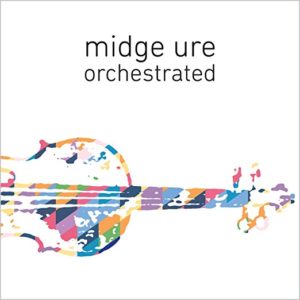Under normal circumstances, an artist re-recording songs from their past with an orchestra is a ‘last refuge of the scoundrel’ sort of move, a cynical attempt at giving the fans something “new” while barely lifting a finger. In the case of Midge Ure, Ultravox frontman and co-writer of Saint Bob Geldof’s Band Aid benefit single “Do They Know It’s Christmas?,” the idea of an orchestral album isn’t a question of when, but rather why it took this long for it to happen. Ultravox’s music drips with melancholy – hell, they had a violinist in the band – making his entire catalog fair game for an orchestral album. The question then comes down to, “Well, shit, which songs do we choose?”
 It would have been very easy for Ure to take the easy way out with Orchestrated, but one glance at the track listing shows that he wants this album to matter, damn it. Several Ultravox standards are forsaken in favor of deep cuts, and Ure closes the album not with an Ultravox song, but rather the title track of his most recent solo album Fragile. For the unfamiliar, this is a brilliant move.
It would have been very easy for Ure to take the easy way out with Orchestrated, but one glance at the track listing shows that he wants this album to matter, damn it. Several Ultravox standards are forsaken in favor of deep cuts, and Ure closes the album not with an Ultravox song, but rather the title track of his most recent solo album Fragile. For the unfamiliar, this is a brilliant move.
Another smart move is the willingness to break away from the original arrangement, or at least the tempo. “Dancing with Tears in My Eyes” is slowed down and stripped of its driving rhythm section, while “Lament” is likewise slightly slowed down but given an upgraded drum track. The song that bears the closest resemblance to its original self, to the surprise of no one, is “Vienna.” And give Ure credit: while he has to try a lot harder to hit those high notes, he can still hit them.
He even wrote a new song for the album. See? Much more than barely lifting a finger.
In nearly every instance, Ure’s judgment when it comes to choosing the hit or the deep cut is spot-on. Rage in Eden’s “Death in the Afternoon” works far better in an orchestral setting than that album’s lead single “The Thin Wall” would have, and the inclusion of Lament track “Man of Two Worlds” is a nice surprise as well. The one where we’d like a do-over is the decision to include “Reap the Wild Wind.” It is surely here because it is the highest-charting song Ure or Ultravox had in the States, but “Visions in Blue” should have been a no-brainer for this album. Piano, synth strings, and that massive build-up after the third verse? Come on now.
Ure clearly understands that at this point in his career, he’s preaching to the converted, which is why Orchestrated works as well as it does. In an alternate universe, one in which Ure is still trying to become a household name, there is a positively unthinkable version of this album, with square pegs like “All Stood Still” crammed into round orchestral holes. Pity the people in that universe.



